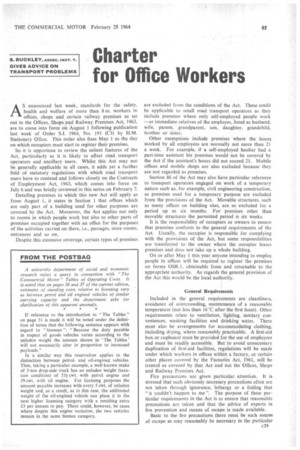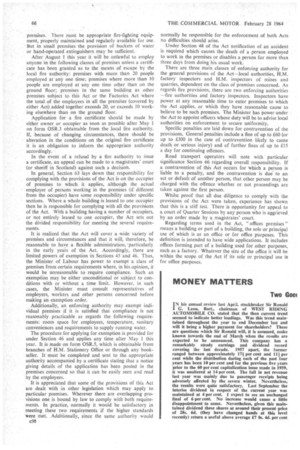Charter for Office Workers
Page 67

Page 68

If you've noticed an error in this article please click here to report it so we can fix it.
AS announced last week, standards for the safety, health and welfare of more than 8 m. workers in offices, shops and certain railway premises as set out in the Offices, Shops and Railway Premises Act, 1963, are to come into force on August I following publication last week of Order S.I. 1964, No. 191 (C3) by H.M. Stationery Office. This order also fixes May 1 as the day on which occupiers must start to register their premises.
So it is opportune to review the salient features of the Act, particularly as it is likely to affect road transport operators and ancillary users. Whilst this Act may not be generally applicable in all cases, it adds yet a further field of statutory regulations with which road transport users have to contend and follows closely on the Contracts of Employment Act, 1963, which comes into force on July 6 and was briefly reviewed in this series on February 7.
Detailing premises to which this new Act will apply as from August 1, it states in Section 1 that offices which are only part of a building used for other purposes are covered by the Act. Moreover, the Act applies not only to rooms in which people work but also to other parts of premises occupied together with an office for the purposes of the activities carried on there, i.e., passages, store rooms, entrances and so on.
Despite this extensive coverage, certain types of premises
are excluded from the conditions of the Act. These could be applicable to small road transport operators as they include premises where only self-employed people work —or immediate relatives of the employer, listed as husband, wife, parent, grandparent, son, daughter, grandchild, brother or sister.
Other exemptions include premises where the hours worked by all employees are normally not more than 21 a week. For example, if a self-employed haulier had a part-time assistant his premises would not be covered by the Act if the assistant's hours did not exceed 21. Mobile offices and mobile shops are also excluded because they are not regarded as premises.
Section 86 of the Act may also have particular reference to transport operators engaged on work of a temporary nature such as, for example, civil engineering construction, as premises used for a temporary purpose are excluded from the provisions of the Act. Movable structures, such as many offices on building sites, are so excluded for a period up to six months. For premises other than movable structures the permitted period is six weeks.
It is the responsibility of occupiers or owners to ensure that premises conform to the general requirements of the Act. Usually, the occupier is responsible for complying with the provisions of the Act, but some responsibilities are transferred to the owner where the occupier leases premises and does not take up a whole building.
On or after May I this year anyone intending to employ people in offices will be required to register the premises on forms OSR.1, obtainable from and returnable to the appropriate authority. As regards the general provision of the Act this would be the local authority.
General RequireMents
Included in the general requirements are cleanline3s, avoidance of overcrowding, maintenance of a reasonable temperature (not less than 16°C after the first hour). Other requirements relate to ventilation, lighting, sanitary conveniences, washing facilities and drinking water. There must also be arrangements for accommodating clothing, including drying, where reasonably practicable. A first-aid box or cupboard must be provided for the use of employees and must be readily accessible. But to avoid unnecessary duplication of first-aid facilities, regulations will be made under which workers in offices within a factory, or certain other places covered by the Factories Act, 1961, will be treated as covered by that Act and not the Offices, Shops and Railway Premises Act.
Fire precautions are given particular attention. It is stressed that such obviously necessary precautions often are not taken through ignorance, lethargy or a feeling that " it couldn't happen to me ". The purpose of these particular requirements in the Act is to ensure that reasonable precautions are taken and that the advice of experts in fire prevention and means of escape is made available.
Basic to the fire precautions there must be such means of escape as may reasonably be necessary in the particular premises. There must be appropriate fire-fighting equipment, properly maintained and regularly available for use. But in small premises the provision of buckets of water or hand-operated extinguishers may be sufficient.
After August 1 this year it will be unlawful to employ anyone in the following classes of premises unless a certificate has been granted as to the means of escane by the local fire authority: premises with more than 20 people employed at any one time; premises where more than 10 people are employed at any one time other than on the ground floor; premises in the same building as other premises subject to this Act or the Factories Act where the total of the employees in all the premiSes (covered by either Act) added together exceeds 20, or exceeds /0 working elsewhere than on the ground floor.
Application for a fire certificate should be made by either owner or occupier as soon as possible after May I on form OSR.3 obtainable from the local fire authority. If, because of changing circumstances, there should be alteration in the conditions on the original fire certificate it is an obligation to inform the appropriate authority accordingly.
In the event of a refusal by a fire authority to issue a certificate, an appeal can be made to a magistrates' court (or sheriff in Scotland) against such a decision.
In general, Section 63 lays down that responsibility for complying with the provisions of the Act is on the occupier of premises to which it applies, although the actual employer of persons working in the premises (if different from the occupier) have some responsibility under specific sections. Where a whole building is leased to one occupier then he is responsible for complying with all the provisions of the Act. With a building having a number of occupiers, or not entirely leased to one occupier, the Act sets out the divided responsibility for meeting the several requirements.
It is realized that the Act will cover a wide variety of premises and circumstances and that it will, therefore, be reasonable to have a flexible• administration, -particularly in the early years of the Act. Accordingly, there are limited powers of exemption in, Sections 45 and 46. Thus, the Minister of Labour has power to exempt a class of premises from certain requirements where, in his opinion, it would be unreasonable to require compliance. Such an exemption may be either unconditional or subject to conditions with or without a time limit. However, in such cases, the Minister must consult representatives of employers, workers and other persons concerned before making an exemption order.
Additionally, an enforcing authority may exempt individual premises if it is satisfied that compliance is not reasonably practicable as regards the following requirements: room space for employees, temperature, sanitary conveniences and requirements to supply running water.
The procedure for applying for exemption is provided for under Section 46 and applies any time after May 1 this year. It is made on form OSR5, which is obtainable from branches of H.M. Stationery Office or through any bookseller. It must be completed and sent to the. appropriate authority accompanied by a certificate stating that a notice giving details of the application has been posted in the premises concerned so that it can be easily seen and read by the employees.
It is appreciated that some of the provisions of this Act are dealt with in other legislation which may apply to particular premises. Wherever there are overlapping provisions one is bound by law to comply with both requirements. In practice, normally it would be satisfactory in meeting these two requirements if the higher standards were met. Additionally, since the same authority would c30 normally be responsible for the enforcement of both Acts no difficulties should arise.
Under Section 48 of the Act notification of an accident is required which causes the death of a person employed to work in the premises or disables a person for more than three days from doing his usual work.
There are three main classes of enforcing authority for the general provisions of the Act—local authorities, H.M. factory inspectors and II.M. inspectors of mines and quarries, dependent on the class of premises concerned. As regards fire provisions, there are two enforcing authorities —fire 'authorities and factory inspectors. Inspectors have power at any reasonable time to enter premises to which the Act applies, or which they have reasonable cause to believe to be such premises. The Minister has power under the Act to appoint officers whose duty will be to advise local authorities on enforcement to secure uniformity.
Specific penalties are laid down for contravention of the provisions. General penalties include a fine of up to £60 (or up to £300 in the case of contravention likely to cause death or serious injury) and of further fines of up to £15 a day for continuing offences.
Road transport operators will note with particular significance Section 66 regarding overall responsibility. If a contravention of this Act occurs for which a person is liable to a penalty, and the contravention is due to an act or default of another person, that other person may be charged with the offence whether or not proceedings are taken against the first person.
Whilst proof that all due diligence to comply with the provisions of the Act were taken, experience has shown that this is a stiff test. There is opportunity for appeal to a court of Quarter Sessions by any person who is aggrieved by an order made by a magistrates' court.
Regarding terms used in the Act, "offices premises" means a building or part of a building, the sole or principal use of which is as an office or for office purposes. This definition is intended to have wide applications. It includes offices forming part of a building used for other purposes, such as a factory. Whatever the size of the office it will be within the scope of the Act if its sole or principal use is for office purposes.












































































































